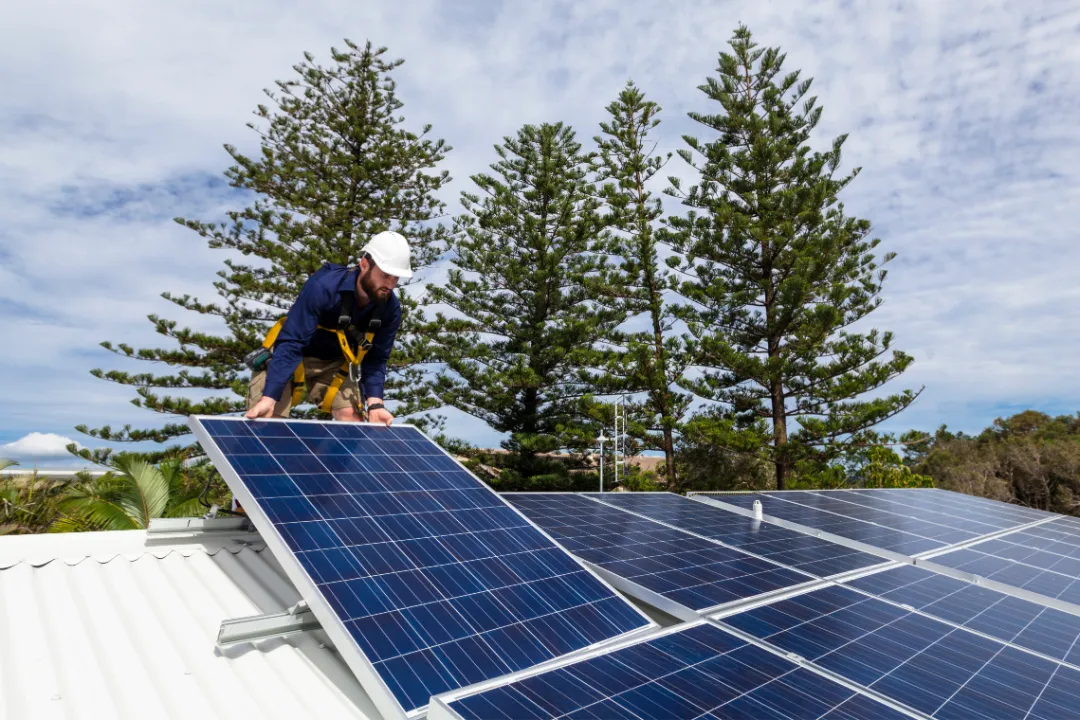DADE CITY SOLAR PROS BLOG
Welcome to our blog about all things solar energy.

Shining Bright: How Solar Energy Is Revolutionizing Power Generation
Did you know that solar energy is rapidly transforming the way we generate power? It's true. With advancements in technology and increasing environmental concerns, solar energy has emerged as a sustainable and efficient alternative to traditional methods of electricity production. From harnessing the power of the sun to empowering communities and combating climate change, solar energy is shining bright as a game-changer in the power generation industry. But how exactly is it revolutionizing the way we generate power? Stay with us as we explore the incredible potential and impact of solar energy.
Solar Energy: A Sustainable Power Source
Solar energy is revolutionizing power generation by providing a sustainable and environmentally friendly alternative to traditional fossil fuels. With the increasing concerns about climate change and the need for clean energy sources, solar power has emerged as a viable solution. One of the key advantages of solar energy is its efficiency. Solar panels are becoming more efficient in converting sunlight into electricity, with some newer models reaching an efficiency of over 20%. This means that more energy can be produced using fewer solar panels, reducing the overall cost of solar energy systems.
Speaking of costs, the affordability of solar energy is also a significant factor in its growing popularity. Over the years, the cost of solar panels has significantly decreased, making them more accessible to a wider range of consumers. In addition, government incentives and tax credits further incentivize the adoption of solar energy systems, making them an even more attractive option. As a result, more homeowners and businesses are turning to solar power as a cost-effective and sustainable solution for their energy needs.
Harnessing the Power of the Sun
By capturing the abundant energy radiating from the sun, we can tap into a virtually limitless power source that can revolutionize the way we generate electricity. Solar energy applications have made significant progress in recent years, with advancements in technology and improvements in solar energy efficiency.
One of the most common uses of solar energy is in the form of photovoltaic (PV) cells, which convert sunlight directly into electricity. These cells are widely used in solar panels, which can be installed on rooftops or in large solar farms to generate electricity for homes, businesses, and even entire communities. The efficiency of PV cells has greatly improved over the years, making solar energy a more viable and cost-effective option for electricity generation.
Solar energy is also being harnessed for heating purposes. Solar thermal systems use the sun's energy to heat water or air, which can then be used for various applications such as heating buildings, swimming pools, or even powering industrial processes. These systems can significantly reduce the reliance on fossil fuels for heating, leading to both environmental and economic benefits.
In addition to electricity generation and heating, solar energy is also being used in other innovative ways. For example, solar-powered desalination plants are being developed to provide clean drinking water in areas with limited access to fresh water sources. Solar energy is also being integrated into transportation systems, with solar-powered vehicles and charging stations becoming more common.
Solar Panels: The Key to Energy Independence
Harnessing the power of the sun, solar panels have become the key to achieving energy independence. With the constant advancement in solar technology, these panels have seen significant improvements in energy efficiency. Solar technology advancements have allowed panels to convert sunlight into electricity more efficiently than ever before. The increased efficiency means that solar panels can generate more power from the same amount of sunlight, making them a reliable source of energy for homes, businesses, and even entire communities.
One of the main advantages of solar panels is their ability to generate electricity without relying on fossil fuels. This not only reduces our dependence on non-renewable energy sources but also decreases greenhouse gas emissions, mitigating the effects of climate change. By harnessing the power of the sun, we can create a sustainable and environmentally friendly energy solution.
Furthermore, solar panels offer a practical solution for areas with limited access to electricity grids. Remote communities and developing countries can benefit greatly from solar energy, as it provides a reliable and cost-effective source of power. Solar panels can be installed on rooftops, in open spaces, or even integrated into building materials, making them versatile and adaptable to various environments.
Solar Farms: Fueling Communities With Renewable Energy
How can solar farms contribute to fueling communities with renewable energy? Solar farms play a crucial role in providing communities with clean and sustainable power. These large-scale installations harness the power of the sun to generate electricity, offering numerous community benefits and economic opportunities.
One of the primary community benefits of solar farms is the reduction in greenhouse gas emissions. By replacing fossil fuel-based energy sources, solar farms help combat climate change and improve air quality, leading to healthier and more sustainable communities. Additionally, solar farms contribute to energy independence by reducing dependence on imported fuels, ensuring a more reliable and resilient energy supply for local communities.
Solar farms also create significant economic opportunities for communities. They stimulate job growth by creating employment opportunities in various sectors, such as construction, installation, and maintenance. Moreover, solar farms attract investments and promote local economic development. As the demand for renewable energy continues to rise, communities with solar farms can capitalize on this trend by attracting green businesses and fostering a sustainable economy.
Solar Energy Storage and Grid Integration
As we explore the next phase of solar energy's impact on communities, we turn our attention to the crucial role of solar energy storage and its integration into the power grid. Solar energy storage technology plays a vital role in maximizing the benefits of solar power by addressing its intermittent nature. By storing excess energy generated during times of high solar irradiation, it ensures a reliable supply of electricity even when the sun is not shining.
Smart grid integration is the key to effectively utilizing solar energy storage technology. It allows for seamless communication and coordination between the solar energy system, storage units, and the power grid. This integration enables the power grid to efficiently manage the flow of electricity, optimizing the use of solar energy and minimizing reliance on non-renewable sources.
One of the main challenges in solar energy storage and grid integration is the need for advanced monitoring and control systems. These systems ensure the smooth operation of the grid and prevent issues such as overloading or underutilization of storage units. Additionally, grid operators need to develop effective strategies for incorporating distributed solar energy systems into the existing power infrastructure.
The integration of solar energy storage technology into the power grid brings numerous benefits. It enhances grid stability, reduces transmission losses, and improves the overall efficiency of the electricity system. Furthermore, it enhances the reliability and resilience of the power grid during emergencies or natural disasters.
Solar Energy and the Fight Against Climate Change
Solar energy plays a pivotal role in combating climate change. Not only does it provide a clean and renewable source of power, but it also contributes to job creation and helps reduce air pollution. The adoption of solar energy has the potential to create numerous job opportunities in the installation, manufacturing, and maintenance sectors. As the demand for solar panels and related equipment increases, more workers are needed to meet this demand, leading to job growth in the industry.
Furthermore, solar energy significantly reduces air pollution compared to traditional fossil fuel-based power generation. The burning of fossil fuels releases harmful greenhouse gases and other pollutants into the atmosphere, contributing to climate change and poor air quality. Solar energy, on the other hand, produces electricity without any emissions or pollutants. By replacing fossil fuel power plants with solar energy systems, we can greatly reduce air pollution and its detrimental effects on human health and the environment.
Solar Energy: Empowering Developing Nations
With the positive environmental impact and job creation potential already highlighted, it is clear that solar energy has the power to empower developing nations as well. In many developing countries, access to reliable and affordable energy sources is limited. This hampers economic growth and prevents communities from reaching their full potential. However, solar energy offers a viable and sustainable solution to this problem.
By harnessing the power of the sun, developing nations can empower their communities and drive economic growth. Solar energy systems can be installed in remote areas, providing electricity to schools, hospitals, and households that were previously off the grid. This enables students to study after dark, healthcare facilities to operate efficiently, and businesses to thrive.
Furthermore, solar energy projects create job opportunities for local residents, stimulating economic development. From manufacturing solar panels to installing and maintaining solar systems, there is a range of employment opportunities in the solar industry. This not only reduces unemployment rates but also promotes local entrepreneurship and skill development.
Moreover, solar energy reduces dependence on expensive and polluting fossil fuels. This allows developing nations to allocate their resources towards other pressing needs, such as education and healthcare. By embracing solar energy, these countries can transform their energy landscape, improve living conditions, and foster sustainable economic growth.
Conclusion
In conclusion, solar energy is revolutionizing power generation by offering a sustainable and renewable power source. By harnessing the power of the sun through solar panels and creating solar farms, communities can become more energy independent. Additionally, advancements in solar energy storage and grid integration are further enhancing its potential. Solar energy not only helps combat climate change but also empowers developing nations by providing them access to clean and reliable electricity.
Connect With Us
Locations We Serve:
© Copyright 2026 Dade City Solar Pros. All Rights Reserved.
Terms & Conditions | Privacy Policy

